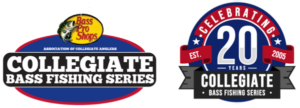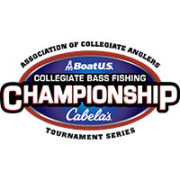Top 3 from the Cabela’s Collegiate Bass Fishing Open
The Cabela’s Collegiate Bass Fishing Open on Lake Dardanelle is in the books. After a tough tournament that tested every team on how they would overcome constantly changing conditions that included lots of current in the river to zero current, stained water changing to muddy water, strong north winds on day one to a light south wind on day two, and air temperatures ranging from the 50’s to temperatures in the upper 70’s. Now that the event is over we’ve taken some time and spoken to each of the top three school teams on their thoughts of the event.
The Murray State team of Hunter Mills, Hunter McKinley, Mike Lowry, and Brian Koch were able to take home 1stplace with 47.92 pounds. Here is what they had to say on winning the event:
1. What were your overall thoughts of the Cabela’s Collegiate Bass Fishing Open?
It’s one of our favorite events of the year because we enjoy fishing as a team where you can communicate between 2 boats that are on different parts of a lake. We think that can help you figure out the bite a lot faster.
2.What was your strategy going into this event?
Our strategy going into the event was to try and find how far along the fish were into the spawn. After a day of practice we could tell that there were fish moving up on beds but we knew there was going to be little cold snap so we focused on the fish who were pre-spawn.
3. Were both boats in the team targeting the same thing on the water or did you have different patterns?
We had different patterns but we were still both targeting pre spawn fish. The fish we were targeting were a lot closer to getting on the beds than our partners.
4. How did being able to communicate with your partner boat help?
We think that the communication helped us out the most mentally. Usually every time our partners called us it was good news. It also helped when if we weren’t catching fish and they were we knew we would have to go change what we were doing and find something more productive.
5. Is there anyone you would like to thank for?
We would like to give our biggest thank you to our parents, who if they weren’t there for us we probably wouldn’t have been able to fish. Our trucks transmission dropped out and we were almost not able to make it to the ramp the first morning but luckily our parents were there to save us! We would also like to thank all of our sponsors who are always there for us when we need a helping hand. Fishermans headquarters for getting us the baits, bag 5 baits for getting us the right colors, Navionics for giving us the Lake maps, dobyns rods, pure fishing, Humminbird, Minn-Kota all of their support is what puts us on the water!
6. Thoughts on the City of Russellville?
We love the city of Russellville it is beautiful and right on lake Dardanelle it can’t get much better for an outdoorsman!
The second place team consisting of Matt Glad, Owen Richard, Dakota Sparks and Levi Sharp from Louisiana State University brought in 42.92lbs over the two Day event. Lets see what they had to say about the Cabela’s Collegiate Bass Fishing open:
1. What were your overall thoughts of the Cabela’s Collegiate Bass Fishing Open?
Our overall thoughts were, as always, very positive. BoatUS is THE BEST collegiate fishing trail because they care more about the anglers and are much more efficient during the tournament. Flight times and numbers are always clear, a great dinner and breakfast is always provided, and getting boats in the water/launching the boats on tournament day is always very efficient, which means a lot when you only have so much time to fish!
2.What was your strategy going into this event?
Our strategy was pretty simple: find a pattern and replicate it in as many areas as we could. Last year, Levi and I got third fishing as a two-man team, so we already had a great history on the lake, and that really helped because while other guys were figuring the lake out, we already knew what to do and spent our time identifying productive areas where the fish were responding to our pattern.
3. Were both boats in the team targeting the same thing on the water or did you have different patterns?
Both boats were targeting laydowns in the water, from 0-6 feet, in backwater areas off of the main river where the current flow wasn’t as strong as the main river. We both ran varying distances north, since the upper half of the lake fishes more like a river and that is what we are comfortable fishing in.
4. How did being able to communicate with your partner boat help?
Communication on the water was the key to our success. Levi and I fished a single area both days, but had 4 different locations that we knew held the fish to win the event. On Day 1, Matt and Owen caught a decent limit but were unable to upgrade, so we spoke to them on the phone and gave them the location that they ultimately ended up fishing the rest of the tournament, and doing very well in. We were also able to communicate which patterns were working for us, like switching to a heavy weight and a craw with a lot of action on the second day to get a reaction bite instead of the lighter weight we had been using. Coming in to the event, we knew that to really have a shot to win it, you needed to fish as a two-boat team, and the communication aspect of the format just allows you to cover more water and to have a larger average fish size.
5. Is there anyone you would like to thank for?
We would like to thank the Cabela’s Collegiate Bass Series staff as a whole, for putting on a great tournament trail and for working hard, even though most anglers will never see everything that goes on behind the scenes to make this possible. We would also like to thank the city of Russellville for being great hosts, and the Best Western for opening up breakfast at 4:30 every morning for construction workers and anglers. That means a lot to college guys!!! I would also like to give a HUGE thank you to Horizon Trike and Marine for getting my aerator housing and intake repaired so quickly after I hit a stump the day before the tournament. They jumped on the boat as soon as we came in and had it wrapped up in 40 minutes, the service is TOP NOTCH!
6. Thoughts on the City of Russellville?
Russellville has treated us well the last two years, with two Top 3 finishes, so it’s one of my favorite places on earth. The food is great, the people are nice, and the lake is an awesome shallow water fishery!
Rounding out the top three we had the highest placing two man team of the event consisting of Jesse Garren and Daniel Holt from Tennessee Tech University’s. These two anglers did not have a partner boat and it was up to just them to bring in 6 fish a day. Here is what they thought of the event:
1. What were your overall thoughts of the Cabela’s Collegiate Bass Fishing Open?
This was our first time fishing the Cabela’s Collegiate Bass Fishing Open and we absolutely loved it. The format is different and with two boats fishing for three fish, it sort of makes it easier targeting those 3 big bites. We always love to attend the Cabela’s tournaments because it is a fun change of pace. Each event is well ran and it is one of the best tournament trails in the country.
2. What was your strategy going into this event?
We weren’t really sure of what to expect, because this was our first time on Lake Dardanelle. We studied our Garmin units mapping and tried to find good spawning areas. We had an idea of what the water temp would be and it set up perfect for what we wanted to do, which was bed fish. We had three hours of practice before the tournament, which was used for sighting and finding our fish on bed and we were able to capitalize in the tournament.
3. Were you concerned going into the event as a one boat team?
Our biggest concern was catching our 6 fish as one boat, while others had to only catch 3. We did not no you could not pool from each others catches and so that added slight worry, however, we were actually able to catch our own 3 fish for each day.
4. What were you targeting on the water?
We spent a week before the tournament sitting in the boat studying our Garmin mapping of good spawning areas. We really targeted shallow, protected areas with deep-water access that had a mixture of gravel, grass and wood.



